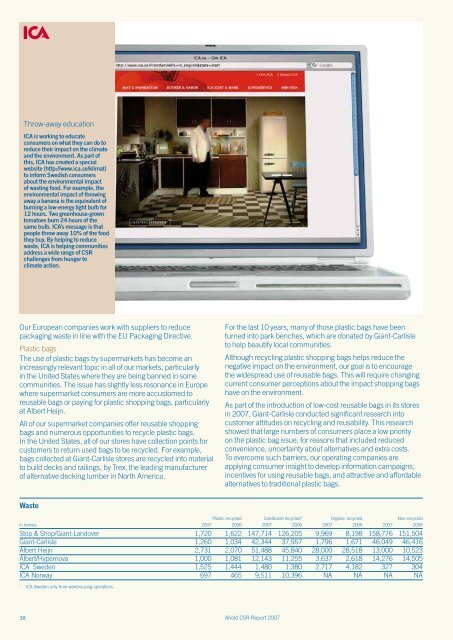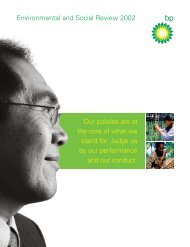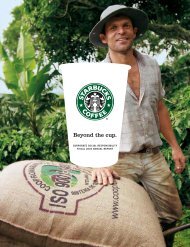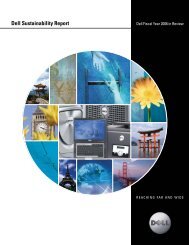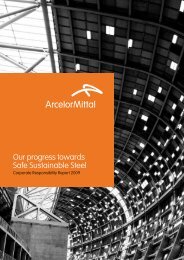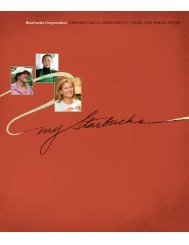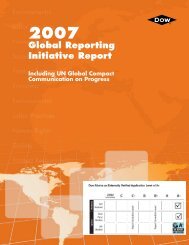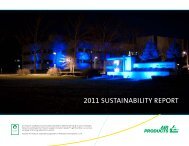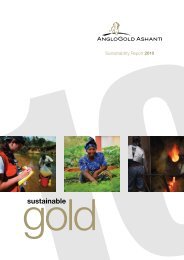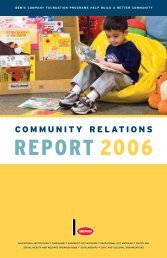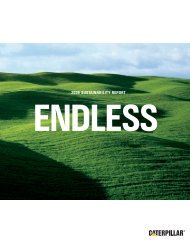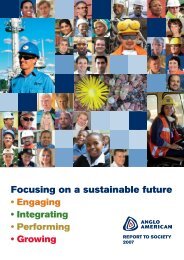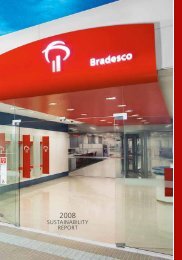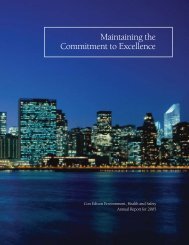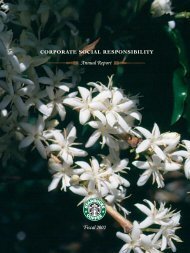Corporate Social Responsibility Report - Ahold
Corporate Social Responsibility Report - Ahold
Corporate Social Responsibility Report - Ahold
Create successful ePaper yourself
Turn your PDF publications into a flip-book with our unique Google optimized e-Paper software.
Throw-away educationICA is working to educateconsumers on what they can do toreduce their impact on the climateand the environment. As part ofthis, ICA has created a specialwebsite (http://www.ica.se/klimat)to inform Swedish consumersabout the environmental impactof wasting food. For example, theenvironmental impact of throwingaway a banana is the equivalent ofburning a low-energy light bulb for12 hours. Two greenhouse-growntomatoes burn 24 hours of thesame bulb. ICA’s message is thatpeople throw away 10% of the foodthey buy. By helping to reducewaste, ICA is helping communitiesaddress a wide range of CSRchallenges from hunger toclimate action.Our European companies work with suppliers to reducepackaging waste in line with the EU Packaging Directive.Plastic bagsThe use of plastic bags by supermarkets has become anincreasingly relevant topic in all of our markets, particularlyin the United States where they are being banned in somecommunities. The issue has slightly less resonance in Europewhere supermarket consumers are more accustomed toreusable bags or paying for plastic shopping bags, particularlyat Albert Heijn.All of our supermarket companies offer reusable shoppingbags and numerous opportunities to recycle plastic bags.In the United States, all of our stores have collection points forcustomers to return used bags to be recycled. For example,bags collected at Giant-Carlisle stores are recycled into materialto build decks and railings, by Trex, the leading manufacturerof alternative decking lumber in North America.For the last 10 years, many of those plastic bags have beenturned into park benches, which are donated by Giant-Carlisleto help beautify local communities.Although recycling plastic shopping bags helps reduce thenegative impact on the environment, our goal is to encouragethe widespread use of reusable bags. This will require changingcurrent consumer perceptions about the impact shopping bagshave on the environment.As part of the introduction of low-cost reusable bags in its storesin 2007, Giant-Carlisle conducted significant research intocustomer attitudes on recycling and reusability. This researchshowed that large numbers of consumers place a low priorityon the plastic bag issue, for reasons that included reducedconvenience, uncertainty about alternatives and extra costs.To overcome such barriers, our operating companies areapplying consumer insight to develop information campaigns,incentives for using reusable bags, and attractive and affordablealternatives to traditional plastic bags.WastePlastic recycled Cardboard recycled 1 Organic recycled Non-recycledin tonnes 2007 2006 2007 2006 2007 2006 2007 2006Stop & Shop/Giant-Landover 1,720 1,622 147,714 126,205 9,969 8,198 158,776 151,504Giant-Carlisle 1,260 1,034 42,344 37,957 1,796 1,671 46,049 46,416Albert Heijn 2,731 2,070 51,488 45,840 28,000 28,518 13,000 10,523Albert/Hypernova 1,000 1,081 12,143 11,255 3,637 2,618 14,276 14,505ICA Sweden 1,525 1,444 1,480 1,380 2,717 4,182 327 304ICA Norway 697 465 9,511 10,396 NA NA NA NA1ICA Sweden only from warehousing operations.38<strong>Ahold</strong> CSR <strong>Report</strong> 2007


